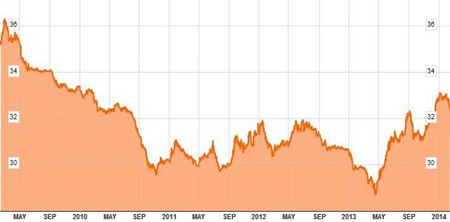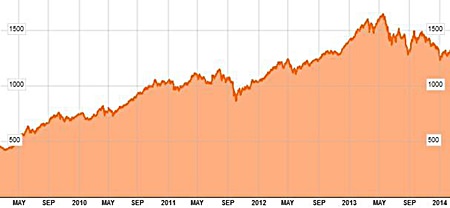China
Depending on your view, China is either the future economic powerhouse or the home of huge credit and property bubbles. Those who invested in the Fidelity China Region fund 15 years ago would have fared better than the same investment in the S&P.1 That said, the annual compounded return would have been 5% – not exactly the world’s latest great growth story.
On the other side there are the stories of the ghost cities and newly-completed empty shopping centres. Growing cynicism about Chinese economic data combined with concerns about the imbalances generated by years of financial repression, the latest being the wealth management products fiasco, seem to be building a perfect storm for China. Creative destruction could well bring about the kind of change that emerging market guru Dr. Mark Mobius of Franklin Templeton described while speaking at an event in Bangkok last year:
USD-THB Exchange rate 2009-2014
 Source: Bloomberg
Source: Bloomberg
“Many of the existing public companies in China will not be able to adapt as they would need to do to be able to survive the changes that will take place in China in the coming years. Conversely, many of the companies that will be the winners in the new landscape haven’t even been formed yet or are still private, unlisted companies or if they are listed, they might be the smaller companies that nobody has even heard of yet. This creates great investor risk but enormous investor opportunity.”
Mark Mobius is one of the few who has the skill and experience to exploit the opportunity – I worry that many investors will simply take the risks and not participate in the rewards.
Japan
As mentioned above, Japan has a demographic crisis on its hands: the population is getting older and in 20 years’ time, one worker will be trying to pay for the upkeep of four people.2 Abenomics will not be able to change that and yet the Bank of Japan seems determined to print, print and print more money. Its last attempt at this was in 1930s and led to hyperinflation, political upheaval and an expansionist policy that brought it into war. It probably wasn’t the wisest political move but Japanese finance minister Taro Aso’s comment that the elderly should be allowed to “hurry up and die”3 epitomised the pressure on a government which is borrowing half of its national budget every year.
Thailand
Whilst Mark Mobius’s assertion that the local economy and its politics usually act as if they’re barely acquainted is correct, GDP grew by only 0.6% in Q4 2013. Overall, the economy grew by 2.9 last year, down from 6.5% in 2012. Of course it is all too easy to blame the protests alone: the government has seemed hell bent on disrupting a flourishing economy by indebting the country with schemes such as subsidies to first-time car buyers and the rice-pledge scheme. The latter guarantees buying rice from farmers; as the state has not managed to sell on most of the rice and there are accusations of widespread corruption, the cost has shot up from USD 15.5bn to USD 21.6bn.
Thai Stock Exchange (2009-2014)
 Source: Bloomberg
Source: Bloomberg
All that said, the Thai stock exchange index is at a similar level to that of June 2012 and, while the Baht has weakened since the protests began, it is far stronger than 2009 levels. It seems Mobius is correct after all but few other markets have receded that far; so at these levels Thailand’s capital markets, notwithstanding the risks, may actually be one of the better opportunities.
Brazil
The strength of its currency, the Real, has made Brazil an expensive place to do business. The Real was at 3/USD in 2004, then went as low as 1.55/USD at some points in 2008 and 2011 had a median of around 2.2/USD last year. It is estimated that more than 40 million people have emerged from poverty in the last decade into a rapidly growing middle class.4
Nevertheless, forecasts for economic growth in 2014, which were originally set 1.90% have been pegged back to 1.79%. One concern is that the country has spent and is continuing to spent vast amounts on sporting facilities for this year’s football World Cup, where some host cities require new airports and roads; and the 2016 Olympic Games in Rio.
Argentina
In 1914, Harrods decided to set up shop overseas for the first time. It chose Buenos Aires as the starting point. At the time, Argentina’s GDP per capita was greater than that of Germany, France and Italy.5 It is now what former US secretary of state Henry Kissinger called a “dagger aimed at the heart of Antarctica.”6 Chileans and Uruguayans are now richer. In mid-January, the central bank’s reserves went below USD 30bn, forcing the government to stop injecting vast sums of dollars into the exchange market to support the over-valued peso. This sent the peso crashing down from ARS 7 to 8 per USD in just over a day. Products were pulled off shop shelves and retailers started to mark up the prices of the goods which remained.7
Africa
As Collum points out8, “Africa has no ports [well, few, anyway] no inland waterways, no property laws, weak educational systems, more AIDS than any region of the world, a large machete-toting populace and numerous oppressive dictators.” It is truly difficult to see a way out for the continent in the near future.
Summary
It’s clear that 2014 will be another challenging year for investors – but with no end in sight to the problems that plague markets; so that remains the hand that we’re likely to be dealt for many years to come.
Last year was the year of the central bankers and their generosity was appreciated by US equity investors. What effect tapering will ultimately have on US and other capital markets remains to be seen, as indeed does the whole impact of the consequences of the great fiscal and monetary experiment. This experiment has been conducted for some 30 years now but which is gathering pace like the final scenes in a horror movie building up to a climax.
However, none of us really knows whether that climax will occur this year, next year or beyond or whether it will be dramatic or anti-climactic. What is clear is that, in such uncertain times, pragmatic diversification across asset classes remains the best chance to avoid sudden downturns and to capture the various and unpredictable opportunities that are being thrown up. Focus on a single asset, asset class or even investment methodology and you might be lucky for a while but the chances of luck guiding you successfully to the end of the investment marathon aren’t good.
Trusting in diversification is a more reliable way to achieve a desired outcome. Above all, understand your liquidity and risk tolerances and make sure you adhere to them – one of the main themes that I’ve seen over the last few years has been the pressure on investors to deviate from their own risk profile to chase returns – of course this is OK when they get away with it. However, in the long run that doesn’t happen and I hear of so many investors, personal, professional and institutional, who have thrown away their investment compasses in the pursuit of yield or return, that I know that this is a story that on a massive scale is going to end very, very badly. My best advice is that if 2014 turns out to be the year of reckoning, don’t let yourself be among the vast majority who are caught out.
Footnotes:
1 2013 Year in Review, David Collum
2 Richard A. Marin, Global Pension Crisis
3 www.theguardian.co.uk/world/2013/jan/227elderly-hurry-up-die-japanese
4 http://www.bloomberg.com/news/2014-01-23/the-mirage-behind-brazil-s-economic-miracle.html
5 http://www.economist.com/news/leaders/21596515-there-are-lessons-many-governments-one-countrys-100-years-decline-parable
6 2013 Year in Review, David Collum
7 http://www.theguardian.com/world/2014/feb/01/argentina-peso-crisis-shakes-queen-cristina
8 2013 Year in Review, David Collum
| MBMG Group Investment Advisory is a Thai SEC regulated investment advisory firm in Thailand that provides sound and impartial advice to assist private, corporate and institutional clients in all aspects of their financial life. For more information, please contact us at [email protected] or call 02 665 2534-9. Please Note: 1.While every effort has been made to ensure that the information contained herein is correct, MBMG Investment Advisory cannot be held responsible for any errors that may occur. The views of the contributors may not necessarily reflect the house view of MBMG Investment Advisory. Views and opinions expressed herein may change with market conditions and should not be used in isolation. 2. With investment comes risks. Please study all relevant information carefully before making any investment decision. 3. An investment is not a deposit, it carries investment risk. Investors are encouraged to make an investment only when investing in such an asset corresponds with their own objectives and only after they have acknowledged all risks and have been informed that the return may be more or less than the initial sum. |




